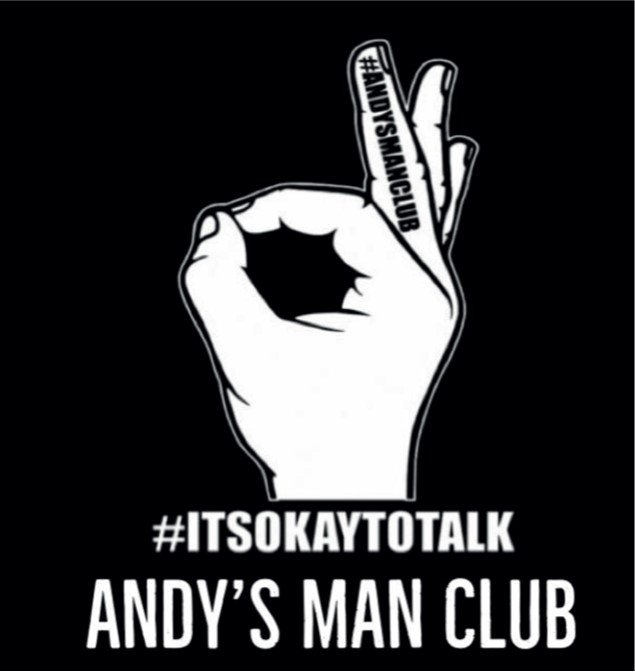The first rule about Andy’s Man Club is it’s OK to talk at Andy’s Man Club.
Simply put, that’s the whole point.
There are no bare-knuckled, bare-chested bouts. Instead, Andy’s Man Club is a safe place where men don’t have to battle to be heard or listened to, but where they can join the fight against reducing the rate of mental illness, depression and suicide in men.
Andy’s Man Club is a male-only peer support group that was set up in 2016 by former Leeds Rhinos rugby player, Luke Ambler, who lost his brother-in-law, Andy Roberts, to suicide.
Luke wanted to prevent another family from going through the trauma, confusion, anger and devastation of burying their son, brother, father or uncle because they felt like they couldn’t – or shouldn’t – talk.
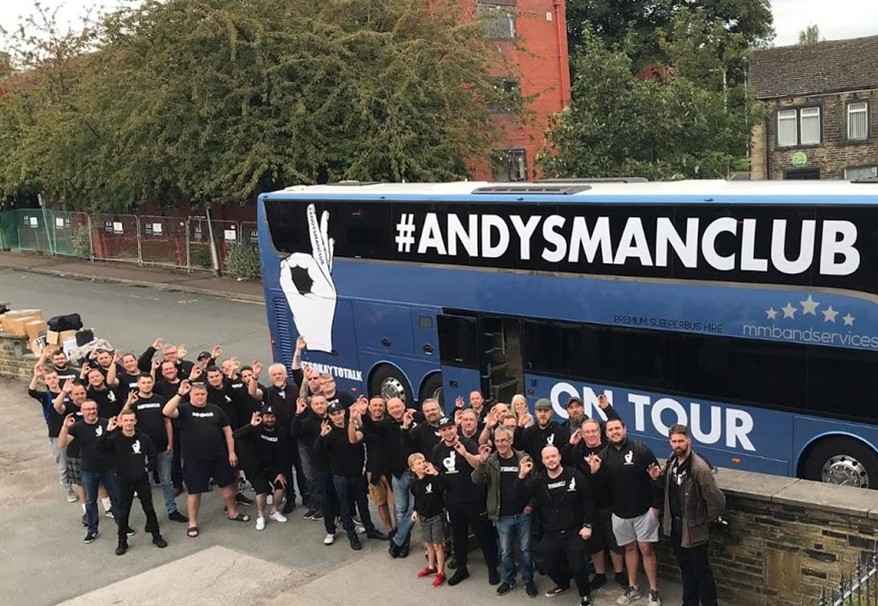
Yes, some men like to escape to the pub for a pint or two or blow off some steam on a lads’ night out. But how many put aside the banter to candidly open up to their friends over a lager?
Men may mock women for having their girls’ nights in with eight bottles of prosecco, Gloria Gaynor blaring out while they sit around denouncing their better halves and putting the world to rights. But the Rotherham facilitator of Andy’s Man Club, Jason Darbyshire, says women have got it right when it comes to talking and men should follow suit.
Apologies if this may seem like generalising and of course there are those who do, but, typically, most men don’t talk about pain, or grief, or problems in life for a number of personal reasons.
Maybe they don’t talk because they don’t want to burden anyone with their issues when they think they should be holding the family together. Perhaps they don’t want to show weakness when they’ve been brought up with the perception that men are strong and don’t cry. Sometimes they’re embarrassed or they may not even know how to put their feelings into words.
But while ever men don’t talk and continue to shut away that voice in their head, their mental health continues to be neglected, sometimes leading to catastrophic extremes.
Andy Roberts was just 23 when he took his own life. He was a devoted father, loving son, and had a group of friends he was going on holiday with. One Monday he went to work as normal, saw his mum Elaine, then decided to end his life that night.
His death left a black hole in the family that affected them all deeply, their grief marred with guilt. Had they missed the warning signs? Could they have done anything differently to stop him feeling like the world would be better off without him in it?
Elaine knew that if Andy had somewhere to go or someone to talk to, her son would still be here. With the simple ethos to save just one other life, she and Luke set up a coffee club for men in Halifax in Andy’s name.
Nine men attended the first meeting in 2016, with Luke setting a goal to have ten clubs in five years. But Andy’s Man Club has quickly gained momentum to now have 28 clubs across the UK, from Perth to Paignton.
Each club meets at the same time each week, 7pm on a Monday night – the same time Andy took his life. They meet in everywhere from community centres to fire stations and football stadiums.
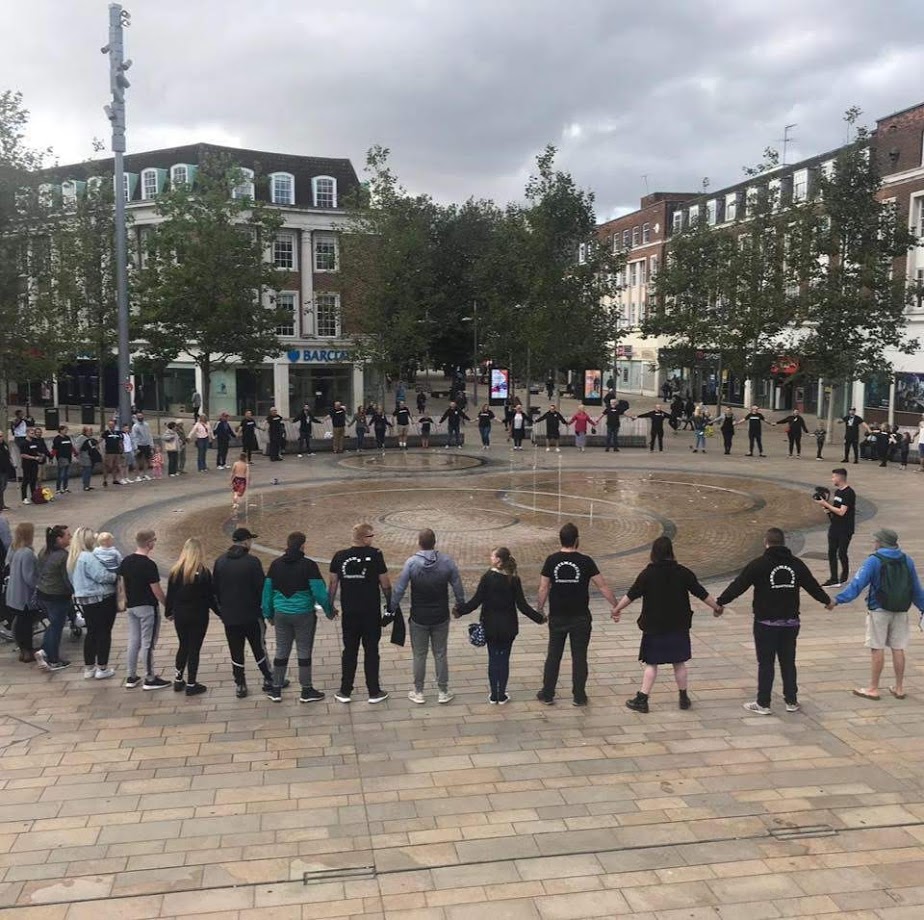
A club was started in Rotherham last December at The Centre in Brinsworth which is led by Jason and fellow facilitator and quickly a weekly attendance of up to 29 men. However, due to Covid, the meetings have since had to move online. But with the state of the current world and the devastation this year has caused, the service has been more in-demand than ever as men are faced with crippling mental health worries.
Suicide is the biggest killer of men under 45. In Rotherham, the suicide rate is greater than the national average and the highest in South Yorkshire, with males accounting for three quarters of these deaths, peaking at the 45-to-49 age bracket.
For Jason, he knew all too well how one event, one unexpected curveball, could trigger a downward spiral into an abyss of self-destruction with the fear of no way out.
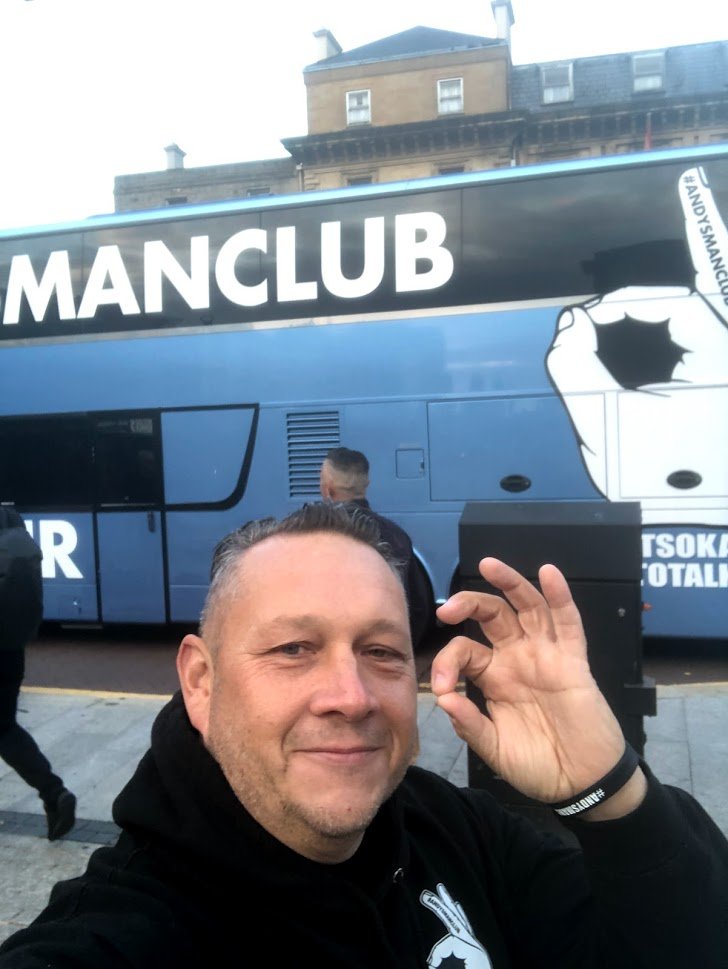
Originally from Hull and with three grown-up children, two years ago aged 42, Jason’s long-term relationship broke down. Because of this, he lost his job, then his friends and family, until he was at rock bottom.
Jason says, although he has a nursing background and was used to trauma, he’d been relatively ignorant to depression.
“I’d always had this attitude of being the man of the house and having to ‘man up’ when I was having an off-day. I have the gift of the gab, am talkative and very much a leader. In my job as a social worker, I’d wear this mask of confidence to support others and bury my own feelings away.
“But at my lowest point the mask just dissolved. I became so low and anxious I couldn’t even get out of bed. It was debilitating.”
With most of his friends forged through work and his ex-partner, Jason says when those parts of his life were taken away, he was left feeling isolated.
But it hit home that he was living precariously on a knife-edge when a close friend took his own life. Jason went down all the right mental health routes by visiting his GP and seeing a counsellor but says for him it felt like a box-ticking exercise.
To complement his therapy sessions, Jason went along to Andy’s Man Club in Hull which he says changed his outlook on life.
“I always say it’s my reset button and part of my routine. Those Monday night meetings help me deal with any rubbish I’ve had the week before and start the new week more positively. We share the highs and lows with tears and laughter which seems to evaporate the bad parts and helps me look forward to the week ahead.”
Last September, Jason relocated to the Dearne Valley to manage a new care home for disabled children. But he didn’t want to lose that reset button and, with Sheffield being the closest group to him, decided to join forces with Ray, who had been going to the Sheffield meetings, to offer another outlet in South Yorkshire.
It could be fair to say we still have a very stereotypical ‘macho’ image in some parts of South Yorkshire with an industrial legacy and strong cultures of pitmen, engineers and steel workers. The men of today may have been brought up being told to ‘grow a pair’ or ‘pull yourself together.’
But society is changing and evolving. It’s okay to talk. It’s okay to cry.
The heavyweight champion of the world, Tyson Fury, spoke openly on national TV about his struggles with depression and suicidal thoughts. Football clubs such as Leeds United and Exeter City are wearing the AMC logo on their training tops to raise awareness. And a big burly rugby lad like Luke is offering you a coffee and a friendly ear to listen.
So, surely other blokes can help break down barriers and stigma surrounding men’s mental health by simply talking about their personal problems.
“AMC is real and raw. There are no airs and graces – we’re men after all – so there can be a few choice words but it’s our way of getting our emotions out. We don’t sugar-coat it,” Jason says.
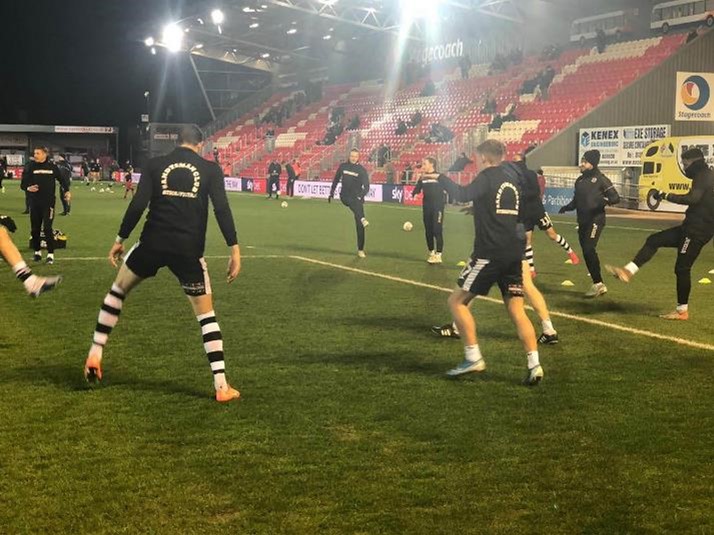
The Rotherham support group encompasses a range of men from directors of multi-million-pound companies to those battling drug addictions. It doesn’t matter what issues you’re dealing with or what background you have; all that matters is that your voice matters.
And what happens at Andy’s Man Club stays at Andy’s Man Club.
No details are kept and there is no registration. While Jason and Ray there for support, there is no pressure or obligation to join in.
But most, if not all, do talk, and many return weekly if necessary.
“There has only ever been one guy I met who didn’t talk for two weeks and after that we couldn’t shut him up which was brilliant to see. We hold onto our emotions so tightly, but you can feel them draining away. Every week without fail we’ve had a man cry but they still come back to us.
“AMC gives men an outlet and an opportunity to talk without ridicule, shame, judgement or embarrassment. We’re a brotherhood where everyone is equal and we don’t discriminate. It takes courage for a man to admit they need help and step through that door.
“Listening to other people’s stories also helps put your own issues into context. We’ve had men talk about their wives or children dying and I’m sat there thinking, ‘God, I’m lucky I only lost my job.’ But no individual problem or situation is trivial.”
You may not think it, but everyone you meet is going through a storm. Some dark clouds may be similar to your own, so don’t fear being left alone without that umbrella of support when it rains.
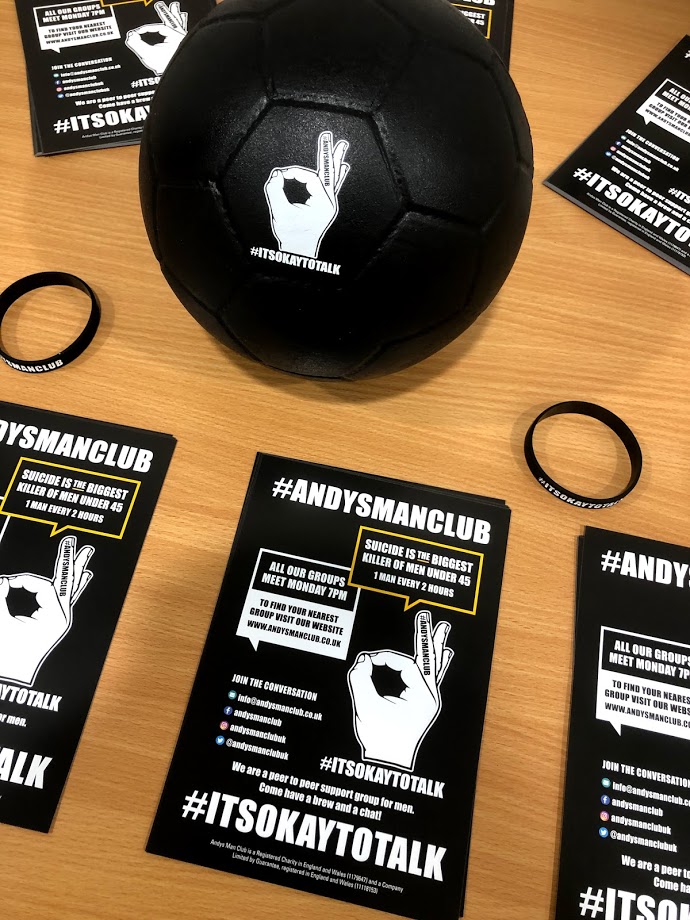
It’s also not just about men with suicidal thoughts. People use AMC to talk about all manner of things from stress and anxiety, to grief after bereavement, or even unexplained anger that is causing issues within their personal lives.
There are not many topics that are off the table, other than debate-causing religion, politics and medication which are part of AMC’s house rules.
Relationships and families play a big part in mental health issues, along with health anxieties or stresses such as infertility and impotency. Some may have financial or work worries and feel like the weight of their world around them balances on their shoulders alone.
Men suffer with PTSD, eating disorders, confidence issues and struggles around their sexuality – a range of problems that can be overwhelming and leave them feeling unable to cope. But men are less likely to reach out to others and more likely to reach for the bottle when those problems arise.
Whether you’re a heterosexual male or from the LGBTQ+ community, men across the spectrum are living with their own problems and Andy’s Man Club is there to make sure nobody feels alone in this world.
As long as you’re respectful and mindful of others, anyone is welcome – except women. There has only ever been one woman attend a group and that was Andy’s mum, Elaine, who went to the initial meeting in Halifax in 2016 and decided from then on Andy’s Man Club would be a refuge for men only where they could feel comfortable to talk openly to their peers without women there.
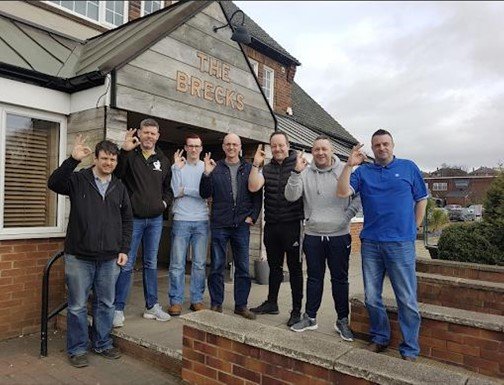
The sessions are based on five questions asked individually to everyone who turns up. Three of these are the same each week: how’s your week been? What are the positives from this week? Anything you’d like to get off your chest? The other two vary and could be anything from what goals you’re setting for the week ahead or what you appreciate in life and why, aimed to make you think positively about the future.
And there is no right or wrong answer. As cliché as it sounds, honesty is the best policy. If you’ve had a rough week, get the debris off your chest and move forward.
We could also learn from AMC to start using those principles in everyday scenarios to get people talking more, regardless of gender. Ask those at work how their weekend has been, what positives your friends have achieved this week, or if your partner or family member has anything to get off their chest.
We can all try a little harder to do a little better.
Jason and Ray, like all the AMC facilitators, are both volunteers who dedicate their Monday nights to ensuring men have someone to talk to. Collectively throughout the UK, Andy’s Man Club has helped thousands of men, averaging around 900 each week.
Yes, some men may have needed a gentle shove by their partners or parents, children or friends, but as Jason says, men need to do it to help themselves.
“I was in the darkest hole I could be in two years ago but I’m glad I found Andy’s Man Club. I proved I could get out relatively unscathed and looking back I’m glad I went through what I did, losing everything, as I wouldn’t be where I am or doing what I do today without being at that breaking point.”
If you want to join the conversation, follow their Facebook page to find out how to join in the virtual sessions and when the meetings at The Centre Brinsworth will be back up and running again.
